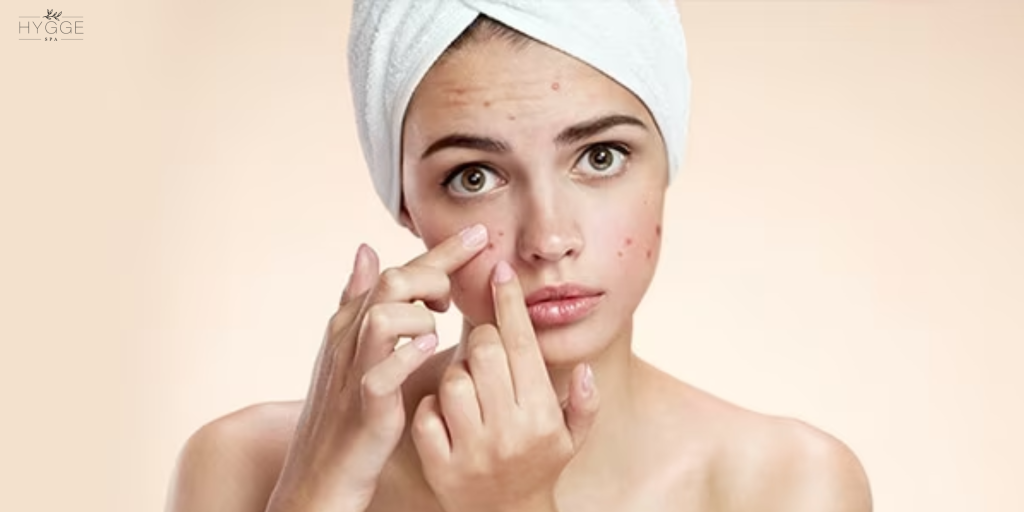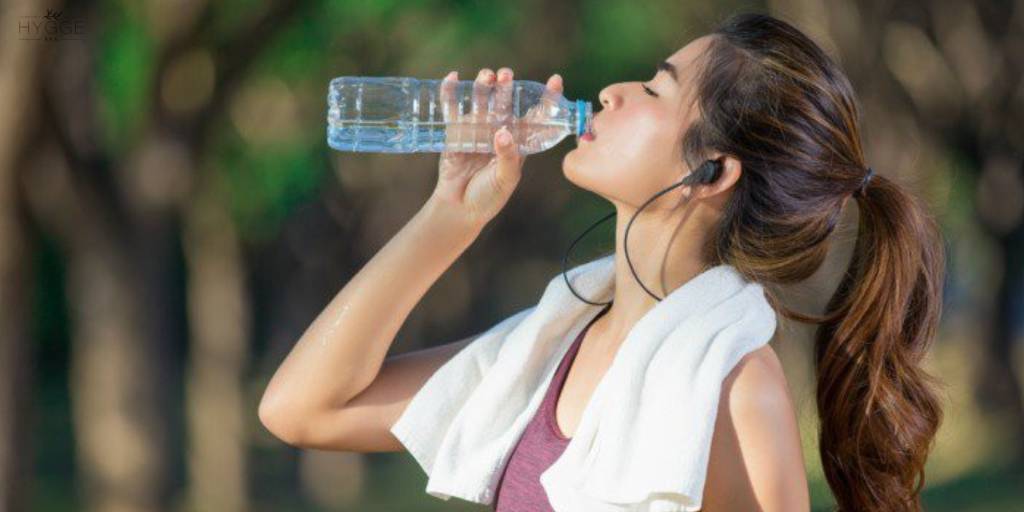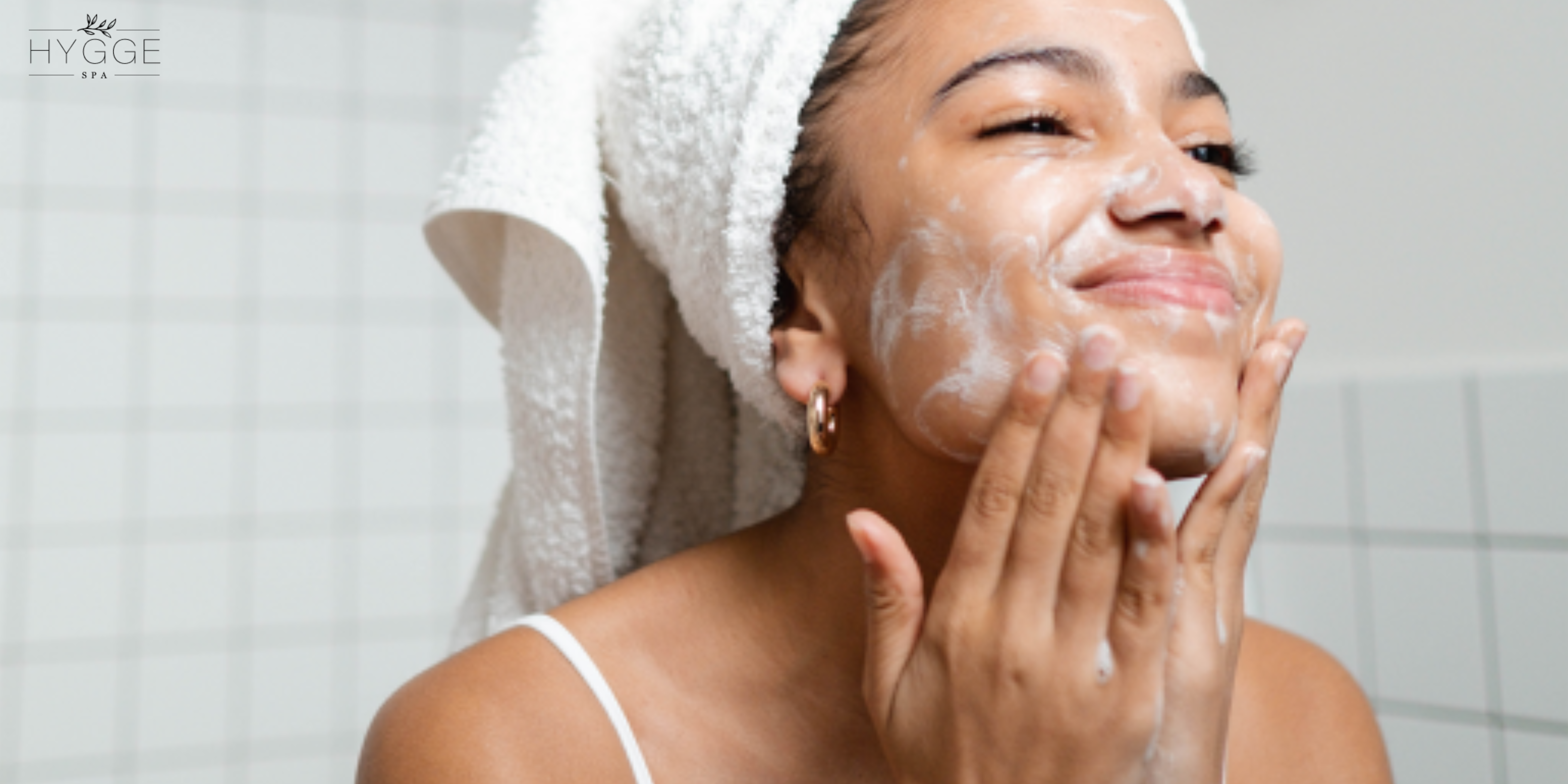The stresses of everyday life can often leave us feeling overwhelmed and disconnected from ourselves. Regular self-care practices can help us regain balance, maintain good health, and foster a sense of inner peace. From skincare routines to stress management techniques and relaxation exercises, here are some self-care tips you can incorporate into your daily life to help you manage stress, take care of your skin, and achieve overall well-being at home.
Effects of Stress on Skin

Stress can have a significant impact on skin health, leading to or exacerbating various conditions and affecting the skin’s overall appearance and vitality. Here are some ways in which stress can affect the skin:
- Acne and Breakouts: When the body is stressed, it produces more cortisol, a stress hormone, which can stimulate the skin’s oil glands to produce more sebum (oil). This excess oil, in combination with dead skin cells and bacteria, can clog pores, leading to inflammation and breakouts.
- Premature Aging: Chronic stress can accelerate the aging process of the skin. Stress leads to persistent inflammation, which can break down collagen and elastin, the proteins responsible for maintaining skin elasticity and firmness. This breakdown can lead to the formation of wrinkles and fine lines earlier than they would naturally occur.
- Worsening of Skin Conditions: Existing skin conditions like psoriasis, rosacea, and eczema can be exacerbated by stress. Stress can trigger flare-ups, making these conditions more severe and harder to manage.
- Impaired Skin Barrier Function: Stress can weaken the skin’s barrier function, leading to moisture loss and leaving the skin vulnerable to irritants and allergens. This impaired function can result in dry, dehydrated skin and increased skin sensitivity.
- Rashes and Hives: In some people, stress can manifest as physical symptoms like rashes and hives. Stress can cause inflammation that leads to a rash, or it can trigger an immune response causing hives.
- Slower Healing: Stress can slow down the skin’s healing process, making it harder for wounds and blemishes to heal and potentially leading to scarring.
Effects of Stress on the Body
Stress has significant effects on the body, impacting various physical systems and overall health. Although a certain level of stress can be beneficial in short-term situations, promoting alertness and enabling us to handle threats, chronic stress can have negative impacts on our health. Here are some ways that stress affects the body:
- Immune System: Chronic stress weakens the immune system, making the body more susceptible to infections and illnesses. It can also prolong the healing process, which can affect recovery from illnesses, surgeries, or injuries.
- Digestive System: Stress can impact the functioning of the digestive system, leading to issues such as indigestion, acid reflux, stomach cramps, and constipation. Chronic stress can also lead to more serious conditions such as irritable bowel syndrome (IBS) and peptic ulcers.
- Cardiovascular System: Long-term stress increases the risk of hypertension (high blood pressure), heart disease, and stroke. It can cause the heart rate and blood pressure to rise and stimulate the release of fats and sugars into the bloodstream. Over time, these effects can lead to significant cardiovascular damage.
- Respiratory System: Stress can cause rapid breathing or shortness of breath. In people with respiratory conditions such as asthma or chronic obstructive pulmonary disease (COPD), stress can exacerbate symptoms and make breathing even more difficult.
- Musculoskeletal System: In response to stress, muscles tense up as a protective mechanism. If stress persists, muscles may remain partially clenched, leading to aches, pains, and disorders like tension headaches or migraines.
- Nervous System: Chronic stress can impact the brain’s function, contributing to mental health disorders such as depression, anxiety, and insomnia. It can also lead to issues with memory and concentration.
- Endocrine System: Stress triggers the adrenal glands to produce cortisol and adrenaline – the stress hormones. Prolonged stress can lead to adrenal fatigue, causing symptoms like fatigue, body aches, unexplained weight loss, low blood pressure, lightheadedness, loss of body hair, and skin discoloration.
- Reproductive System: In men, prolonged stress can affect testosterone and sperm production, potentially leading to erectile dysfunction or impotence. In women, it can cause irregular menstrual cycles, missed periods, heavier or more painful periods, and worsened premenstrual syndrome (PMS) symptoms.
It’s important to manage stress effectively to prevent these adverse effects. Techniques such as regular exercise, meditation, deep breathing, yoga, and a balanced diet can help regulate stress levels. If you find yourself unable to manage your stress, it may be beneficial to seek help from a healthcare professional.
Tips to take care your skin after longtime stress
Prolonged periods of stress can significantly impact both your skin and body. Here are some comprehensive tips on how to take care of your skin and body after a period of long-term stress:
- Maintain a Healthy Diet: The food you eat directly impacts your body’s overall health and the condition of your skin. Aim for a balanced diet rich in fruits, vegetables, lean protein, and whole grains. Foods high in antioxidants (like berries, spinach, nuts), Omega-3 fatty acids (like salmon, chia seeds), and Vitamin E (like almonds, sunflower seeds) are especially beneficial.
- Stay Hydrated: Drink plenty of water throughout the day to keep your body and skin hydrated. Adequate hydration helps maintain skin elasticity and aids in detoxification, resulting in healthier-looking skin and overall body function.
- Regular Exercise: Regular physical activity boosts circulation, promoting better skin health and overall body function. Exercise also helps alleviate stress, improve mood, and promote better sleep.
- Adequate Sleep: Quality sleep is crucial for both body and skin health. During sleep, your body repairs damaged cells, recovers from daily activities, and rejuvenates your skin. Aim for 7-9 hours of uninterrupted sleep each night.
- Establish a Consistent Skincare Routine: A daily skincare routine that includes cleansing, toning, moisturizing, and sun protection can greatly improve your skin’s health. For specific skin concerns, consider using targeted treatments like serums, masks, or exfoliants.
- Practice Mindfulness and Relaxation Techniques: Activities like yoga, meditation, deep breathing, and mindfulness can help manage stress levels, thus benefiting both your mental health and physical wellbeing, including your skin.
- Limit Alcohol and Avoid Smoking: Alcohol can dehydrate your skin and body, while smoking can cause premature skin aging and other health issues. Avoid smoking and try to limit alcohol intake to moderate levels.
- Protect Your Skin From the Sun: Sun damage can exacerbate stress-related skin issues and accelerate skin aging. Use a broad-spectrum sunscreen with an SPF of at least 30 every day, regardless of the weather.
By taking these steps, you can not only help your body and skin recover from the effects of long-term stress but also equip yourself with tools to manage future stress more effectively.
Good Habits for Facial Skin

You can build and maintain the following good habits to keep your face fresh and radiant.
- Drink plenty of water: Water plays a role in removing toxins, purifying the body, helping you have soft, lively skin. Therefore, drinking water is good for health and maintains a bright complexion.
- Healthy diet: Eating fresh fruit, green vegetables will provide many vitamins, minerals beneficial for the skin. Therefore, a healthy diet will provide the body with vitamin-rich foods making the skin healthier.
- Get enough sleep, on time: Sleeping 8 hours a day not only removes aging wrinkles on the skin but also helps the skin become beautiful from the inside. Going to bed early and on time is a good habit for the skin to become full of life.
- Avoid stimulants: Most alcohol, tobacco, carbonated drinks… are not good for the skin. The acne situation is due to when you are hungry, you drink a lot of coffee or sweets. So, eliminating bad habits will make your skin more beautiful.
Going to a spa can be an incredible way to unwind, relax, and take a break from the pressures of daily life. It can also have some great benefits for your skin and overall health. Here are some reasons why going to a spa can be beneficial.
The methods mentioned above can help you restore both mental health and skin. However, it takes time for your body to get used to and adapt to these healthy habits. Besides the above ways, going to a spa is a way to help you recover your skin and spirit faster, then you just need to take care of and rest enough, maintain healthy living habits. Hygge Spa is an ideal skincare place that you can visit with the following advantages:
Facilities at Hygge Spa are extremely modern, subtly designed. The dominant color takes the gentle colors, so the overall is quite elegant and harmonious. Not only that, the massage rooms are arranged extremely spacious, close to nature, bringing comfort to customers using services at Hygge Spa. In addition to the massage room, Hygge Spa also has separate bathrooms and changing rooms. You can be completely assured of convenience and privacy.
Services at Hygge Spa are extremely diverse and of quality. You can easily choose service packages that suit your needs. Customers can book appointments before coming to Hygge Spa. Some notable services at Hygge Spa include:
- Full body massage
- Foot massage
- Whole body skincare
- Facial skincare
- Nail care, pedicure
- Hair wash
- Kid massage
Hygge Spa owns a team of experienced staff, long-serving in the massage industry. So you can be completely assured of the quality of service when relaxing at the end of the week.
Hopefully, the above article can help you have solutions to restore skin as well as relieve stress. Don’t forget to follow the next articles of Hygge Spa!

